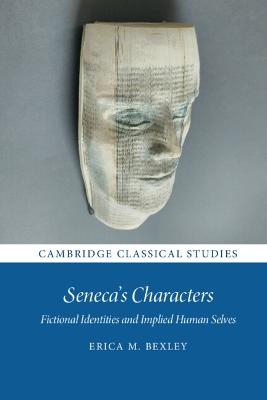
Seneca's Characters
Fictional Identities and Implied Human Selves
Seiten
2022
Cambridge University Press (Verlag)
978-1-108-47760-4 (ISBN)
Cambridge University Press (Verlag)
978-1-108-47760-4 (ISBN)
This book addresses the much-neglected topic of fictional character and its relationship to actual human identity. Through the lens of Senecan tragedy, it tackles questions of behavioural coherence, imitative exemplarity, physical appearance, psychology, and autonomy. It offers fresh insight into Seneca's powerful tragic aesthetics.
Seneca's Characters addresses one of the most enduring and least theorised elements of literature: fictional character and its relationship to actual, human selfhood. Where does the boundary between character and person lie? While the characters we encounter in texts are obviously not 'real' people, they still possess person-like qualities that stimulate our attention and engagement. How is this relationship formulated in contexts of theatrical performance, where characters are set in motion by actual people, actual bodies and voices? This book addresses such questions by focusing on issues of coherence, imitation, appearance and autonomous action. It argues for the plays' sophisticated treatment of character, their acknowledgement of its purely fictional ontology alongside deep – and often dark – appreciation of its quasi-human qualities. Seneca's Characters offers a fresh perspective on the playwright's powerful tragic aesthetics that will stimulate scholars and students alike.
Seneca's Characters addresses one of the most enduring and least theorised elements of literature: fictional character and its relationship to actual, human selfhood. Where does the boundary between character and person lie? While the characters we encounter in texts are obviously not 'real' people, they still possess person-like qualities that stimulate our attention and engagement. How is this relationship formulated in contexts of theatrical performance, where characters are set in motion by actual people, actual bodies and voices? This book addresses such questions by focusing on issues of coherence, imitation, appearance and autonomous action. It argues for the plays' sophisticated treatment of character, their acknowledgement of its purely fictional ontology alongside deep – and often dark – appreciation of its quasi-human qualities. Seneca's Characters offers a fresh perspective on the playwright's powerful tragic aesthetics that will stimulate scholars and students alike.
Erica M. Bexley is an Assistant Professor of Classics at Durham University. She has published in Classical Philology, Classical Journal, Trends in Classics, the Cambridge Classical Journal, and Mnemosyne. This is her first book.
1. Coherence; 2. Exemplarity; 3. Appearance; 4. Autonomy.
| Erscheinungsdatum | 03.05.2022 |
|---|---|
| Reihe/Serie | Cambridge Classical Studies |
| Zusatzinfo | Worked examples or Exercises |
| Verlagsort | Cambridge |
| Sprache | englisch |
| Maße | 144 x 222 mm |
| Gewicht | 620 g |
| Themenwelt | Geschichte ► Allgemeine Geschichte ► Vor- und Frühgeschichte |
| Geschichte ► Allgemeine Geschichte ► Altertum / Antike | |
| Geisteswissenschaften ► Sprach- / Literaturwissenschaft ► Anglistik / Amerikanistik | |
| Geisteswissenschaften ► Sprach- / Literaturwissenschaft ► Literaturwissenschaft | |
| ISBN-10 | 1-108-47760-7 / 1108477607 |
| ISBN-13 | 978-1-108-47760-4 / 9781108477604 |
| Zustand | Neuware |
| Informationen gemäß Produktsicherheitsverordnung (GPSR) | |
| Haben Sie eine Frage zum Produkt? |
Mehr entdecken
aus dem Bereich
aus dem Bereich
Was Pompeji über uns erzählt
Buch | Hardcover (2023)
Propyläen (Verlag)
32,00 €
auf den Spuren der frühen Zivilisationen
Buch | Hardcover (2023)
C.H.Beck (Verlag)
20,00 €


